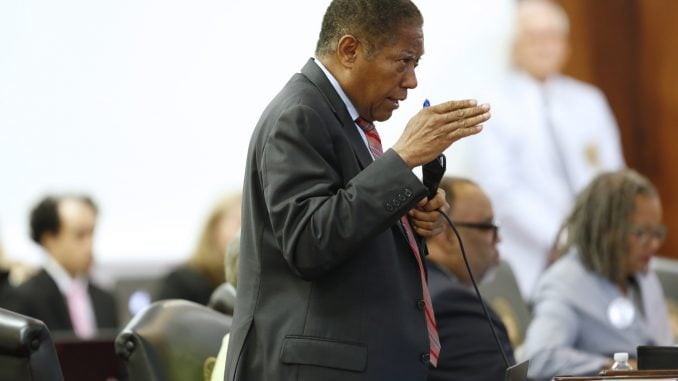
RALEIGH During final deliberations on the $23 billion state budget last month, Sen. Dan Blue (D-Wake) requested a fiscal impact analysis of Republican-sponsored tax cuts being considered as part of the larger budgeting process. Though the budget has been enacted as law, Fiscal Research staff recently provided Blue’s office with a five-year impact statement he requested that suggests the tax cuts will lead to revenue shortfalls in the final three years of the five-year period.Gov. Roy Cooper reacted to the news on Twitter, reiterating his belief that the Republican-passed budget, tax cuts included, is “fiscally irresponsible.” Cooper vetoed the budget, but was overridden by a supermajority vote in the legislature.In response to the revenue deficit alarms, spokeswoman for Senate Republicans Amy Auth countered that the Democrats “erroneously presume we plan to spend at unsustainable levels like they used to.”Blue’s communications director Leslie Rudd in an email to press revealed that “Staff estimates a $1.2 billion shortfall by 2020 and outlined options to offset those losses.”Those options were to reverse recent personal and corporate tax cuts and increase sales taxes, among other budgeting transfers, to address the projected shortfall. The analysis projects the revenue shortfall increasing to approximately $1.4 billion for fiscal year 2021-2022, representing a revenues versus expenditures gap of about 5.5 percent.”Although these are significant amounts,” the letter from Fiscal Research analyst Evan Rodewald reads, “the General Assembly could address this imbalance by reducing expenditures, increasing revenues, or some combination of the two approaches.”However, initial fiscal projections from the nonpartisan staff at the legislature’s Fiscal Research Division in recent years have not exactly been accurate indicators of where revenue totals ultimately end up. Senate Republicans pointed to that fact in their response to the latest projections, while also describing key assumptions in the model used by Fiscal Research that discount actual budgeting patterns practiced by the majority party.That model assumes state government spending will grow between 4 and 5 percent annually, but the recent budgets passed by Republican supermajorities in the General Assembly have limited that spending growth to match that of population and inflation which has yielded increases between 2 and 3 percent.”Our nonpartisan fiscal research staff projects state revenue to grow more than $3.5 billion over the next five years, even with major tax cuts to the middle class,” said Auth on behalf of Senate Republicans. “We have out-performed projections for three years in a row, and only Democrats would consider $3.5 billion in additional taxpayer dollars a ‘cut’ to state government.”While Cooper and leading Democrat lawmakers have consistently maligned tax cuts as favoring the rich at the expense of the poor and vital government programs, Republicans have held firm to continued tax reforms arguing that lower taxes boost the economy and let individual taxpayers across the income spectrum keep more of their hard-earned money. They say recent economic leadership by the Old North State and a string of budget surpluses prove the merit of their policies.A report from George Mason University released Tuesday ranking the budget solvency of the states seems to support the Republicans’ fiscal management policies as well. The report finds North Carolina to be among the top five states for budget solvency, as well as improving six spots since last year to secure the 15th spot in overall fiscal condition. The report measures states’ ability to pay bills, meet long-term spending needs and pension costs, and avoid budget deficits.Last month, top credit rating agency Fitch awarded North Carolina an ‘AAA’ bond rating, citing its “low liabilities, conservative financial operations and long-term prospects for continued economic expansion and diversification.”



